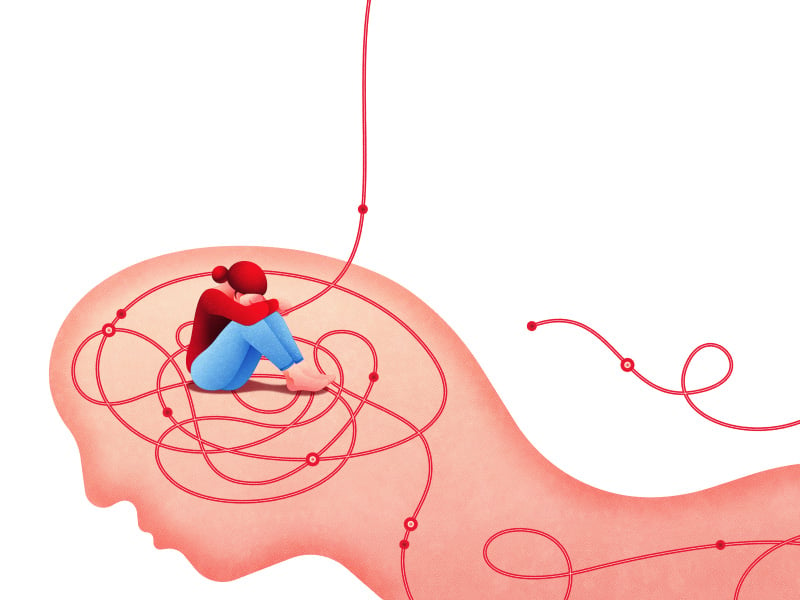Grief is different for everyone, and it can vary from one day to the next.
“One day it may feel like you are being hit by waves of strong feelings, other days there is a sense of normality,” explains Dr Venetia Leonidaki, who is a Consultant Clinical Psychologist. Anger, sadness, despair, guilt and anxiety are all normal parts of grieving, she says.
It can help to prepare for when the waves of grief feel strong. Dr Leonidaki suggests: “Have a ‘first-aid box’ that will help you to cope. Put anything in it that will help on the days that the grief comes. It could be a favourite book, favourite smells or cards with messages that will help you on days that you feel down.”
"Make space for grief, but continue your activities of daily life”
She recommends acknowledging your feelings, without making them the only thing in your life. “Allow your feelings to come and go: process them little by little. Make space for grief, but continue your activities of daily life.
“Also, find time for things that are meaningful for you – this could be doing an event for charity, to honour the person’s memory.”
Writing about her feelings helped Mayuri Patel, 45, when she lost her partner John suddenly in 2019. “Just writing down how I was feeling inside, like a diary, really helped me to get it out of my system, instead of bottling things up inside.
“I used to write to John too, after his death – when he was alive, I used to send him emails and WhatsApp messages, and I just continued to do that.”
It often helps people to do things like this, Dr Leonidaki explains: “The relationship with the person's memory doesn’t have to stop. Writing a letter can be a way of expressing feelings that you didn’t have a chance to. You could also have a ‘memory box’ with their things in it, or things that remind you of them.”
Looking after yourself when you are grieving
When you are grieving, looking after yourself may be the last thing on your mind. However hard it may seem, try to do this, as it will help you to get through this difficult time.
Grief can weaken the immune system, so looking after yourself is important, even though you might feel guilty about it.
“Some people may neglect themselves because they are preoccupied by grief, or perhaps there may be an unconscious wish to die themselves,” says Dr Leonidaki. “All of this is normal, but it’s often more useful to think about what your loved one would have wanted for you – would they want you to be healthy and happy?”
Try to eat healthy, regular meals even if you don’t feel hungry, take your medications and go to bed at your normal time. Drinking alcohol above the recommended safe limits won’t help you to feel better, and may get in the way of you processing your feelings.
Exercising can be particularly helpful for your wellbeing. As well as the mental benefits of exercise, it helps you to stay well too.
Walking and
swimming helped Mayuri through her bereavement. She says: “I couldn’t stay indoors, because I felt I was suffocating. So walking was very helpful. I walked slowly, focusing on what was around me and on my breathing. I found that very calming. I did the same with swimming: I just did lengths and focused on what I was doing.”

A journey back to normality for Mayuri
Mayuri's initial reaction to John's death was shock and disbelief. She was waiting to meet him to have lunch and visit an art gallery. In the two and a half years they’d been together he’d never let her down before. But this time, he didn’t turn up.
Mayuri sent him messages, tried to call and left voicemails. Eventually, she went home. Later that day, John’s sister rang. “She told me the hospital had been in touch,” says Mayuri. “I felt an awful sense of doom. I went to jelly. I couldn’t believe he was gone.”
John, 71, had suffered a burst abdominal aortic aneurysm, which causes severe internal bleeding. Although he had high blood pressure and some heart problems, he was also a keen walker and an active member of his local community – he was in the local choir and a hospital radio DJ – and his death came out of the blue.
Mayuri's disbelief lasted several weeks. This is very common, according to Dr Leonidaki. “Although grief looks different to different people, some of the most common reactions include disbelief or denial. A sudden or traumatic death can make the grieving process more intense.”
Mayuri experienced all of these.
“When someone dies suddenly, so many things haunt your mind. I couldn’t sleep and I couldn’t concentrate – I was very distracted. I felt like someone had switched the light off. Joy had been sucked out of life.”
For a few weeks, day-to-day tasks felt impossible. “The structure of life broke down. I remember feeling very angry and snapping at the kids. My daughter told me it wasn’t fair, that she was sorry it had happened but it wasn’t her fault.”
Mayuri felt lost, and says: “I just had to find a way of coping.” One of the most helpful things was counselling. “It definitely was a lifesaver,” she says. “I was very raw at the beginning. In the first session I just cried a lot. It was very helpful to be able to just cry and not say anything.
“They told me about the different stages of grief, and I identified with them.”
The “five stages of grief”, first described by psychiatrist Elisabeth Kubler-Ross, are denial, anger, bargaining, depression and acceptance.
Although these can be a useful way of describing your feelings, Dr Leonidaki explains that they’re not a timeline. Some people find them helpful, while others don't. “The reality is that grief doesn’t follow through those stages; it can go back and forth between them. It’s a process rather than a single event, and can last months or even years.”
Mayuri, who is self-employed as a pharmacist for the NHS Clinical Commissioning Group in Hackney, London, took a week off work after John’s death, and a few days around the funeral.
When she returned, her colleagues were very helpful. “They were really kind. They just gave me space, because they didn’t want to pressure me.”
But there were still times that Mayuri found work difficult. “I became a bit withdrawn and a few times I had mini breakdowns.” Her colleagues were understanding, and gradually things became easier.
Mayuri did other things to connect with John’s memory, such as visiting the choir that he belonged to and getting copies of his hospital radio shows. “These made me feel connected to John. I used to listen to the recordings a lot. Every time I heard his voice, I would have a cry, but there came a time I didn’t cry as much.”
After some months, things started to feel a bit more normal for Mayuri, and she found ways to start to live with her grief. She tried to focus on her children, and supporting them as her daughter took her GCSEs and her son's move to secondary school.
She says: “John was in my life for a short while. He came and added something to it. But he is gone, and I have to let him go.”
When do you need help to deal with grief?
Sometimes seeing a professional can help you to deal with grief, especially if you don’t have a supportive network around you, or if you feel that you don’t
have the skills to cope. Although there is no right or wrong way to grieve, sometimes grieving can become a disorder that needs professional help. This isn’t easy to define, but signs of this can include:
- a strong and continuing sense of yearning, which doesn’t fade in intensity, a year or more after the person has died
- persistent thoughts of the loved one, or the circumstances of death, in a way that interferes with your life
- excessive avoidance of talking about the person who died or the death
- a strong sense of detachment from people around you
- excessive self-blame
- abusing alcohol or drugs in an attempt to cope with grief
- signs of post-traumatic stress, such as flashbacks or intrusive memories related to death.
If you think you would benefit from support, ask your GP to refer you, or refer yourself through your local IAPT (Improving Access to Psychological Therapies) service – search online for “IAPT services”.
You can also arrange private treatment – check for accredited professionals on the British Association for Counselling and Psychotherapy or UK Council for Psychotherapy websites.
There are also local and national voluntary organisations that offer bereavement support. You can call the Cruse Bereavement Care helpline on 0808 808 1677 or visit cruse.org.uk.







